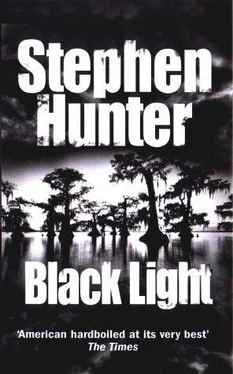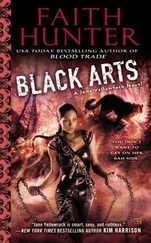Stephen Hunter - Black Light
Здесь есть возможность читать онлайн «Stephen Hunter - Black Light» весь текст электронной книги совершенно бесплатно (целиком полную версию без сокращений). В некоторых случаях можно слушать аудио, скачать через торрент в формате fb2 и присутствует краткое содержание. Год выпуска: 1996, ISBN: 1996, Издательство: Island Books, Жанр: Триллер, на английском языке. Описание произведения, (предисловие) а так же отзывы посетителей доступны на портале библиотеки ЛибКат.
- Название:Black Light
- Автор:
- Издательство:Island Books
- Жанр:
- Год:1996
- ISBN:0-385-48042-3
- Рейтинг книги:3 / 5. Голосов: 1
-
Избранное:Добавить в избранное
- Отзывы:
-
Ваша оценка:
- 60
- 1
- 2
- 3
- 4
- 5
Black Light: краткое содержание, описание и аннотация
Предлагаем к чтению аннотацию, описание, краткое содержание или предисловие (зависит от того, что написал сам автор книги «Black Light»). Если вы не нашли необходимую информацию о книге — напишите в комментариях, мы постараемся отыскать её.
Black Light — читать онлайн бесплатно полную книгу (весь текст) целиком
Ниже представлен текст книги, разбитый по страницам. Система сохранения места последней прочитанной страницы, позволяет с удобством читать онлайн бесплатно книгу «Black Light», без необходимости каждый раз заново искать на чём Вы остановились. Поставьте закладку, и сможете в любой момент перейти на страницу, на которой закончили чтение.
Интервал:
Закладка:
“Where is who?”
“Mrs. Parker.”
“Sir, do you really think any black person knows the whereabouts of every other black person?”
“Well, I wouldn’t know about that. Never thought about it much. I want to help her. That’s why I’m here. She wrote me , don’t you understand?”
“You say you the law?”
“Yes, I am, in a way. But I’m not here to arrest a colored person. It’s about her little girl. She—”
“Oh,” said the woman. “Yes, I know. We don’t never forget that . You wait here.”
She disappeared and then came back in five minutes.
“She’s at her other daughter’s. Out in Longacre Meadows, the development.”
It never occurred to Sam that Negroes could buy homes in Longacre Meadows, a fairly nice residential development east of Blue Eye, where Connie Longacre used to live.
“Do you have an address?”
She gave it to him.
“I’m sorry for being so loud,” he said. “I didn’t mean anything by it.”
“Oh, Mr. Sam,” she said, “I wasn’t here, but Sheila”—now, who the hell was Sheila?—“told me how you tried that white man Jed Posey for beating poor Mr. Fuller to death. No white man ever tried a white man for hurting a black before.”
It had cost Sam an election and a job he loved more than any other.
“Oh, that,” he said. “He deserved the chair. I tried to get it for him but the state of Arkansas wasn’t about to execute a white man for murdering a black one in 1962. At least he’s still in the penitentiary, rotting to hell slowly. Death would have been better, but rot has its place in this world.”
“Somewhere, I believe you trying to be a good white person. I hope Jesus is with you.”
“He’s probably busy today, but I do thank you for the thought.”
Sam drove cast out of Blue Eye down Arkansas 88 with an odd feeling. Goddamned Duane Peck went with him the whole way and Sam tried to concentrate on not speeding and staying on the right side of the road, a task built on the assumption that he knew which side of the road to drive on in the first place, which he did, usually, unless he forgot, as now.
Duane honked and Sam looked up to see an automobile coming right at him. Fool! Why didn’t he turn? Then he saw he was on the wrong side of the road. Had they changed that recently? Agh! Filling with rage, frustration and anguish, he moved back where he belonged. The driver gave him the finger! Now, whatever for?
Eventually, the town fell away. There seemed to be a pleasant space of country, then he passed the double pillars of rock and Cyclone fence that led to Mountaintop, as Boss Harry’s place was called, another ruin now that that goddamned ambitious son of his was running for President and hardly came back to Arkansas at all and when he did he stayed in Fort Smith, not down here in Polk.
Then he felt not a shock, but a terrible melancholy, and he remembered why he’d stopped coming this way. It was when they tore the old Longacre place down, once such a grand house where old man Longacre lived and where his son, Rance, had come with his new bride, Connie, in 1932 and where Connie had raised her son and buried her husband and then buried her son and his young wife, and then lent her cottage to Edie White Pye and soon enough buried Edie. Then when the county took the child and wouldn’t let Connie keep it because she was no relation, and it was taken off by Pye people and then seemed to disappear, Connie, her heart broken for the very last time, seemed to finally give up and acknowledge that Arkansas somehow wasn’t really meant for her, though she loved it so.
Where had Connie gone? Back to Baltimore? He thought so. Connie wouldn’t tell him.
He had driven her to the bus station that last day, after she’d closed the house.
“It’s such a beautiful state,” said Connie. “And the men are so strong: Rance, of course. And my son, Stephen. And Earl, poor, beautiful, brave, doomed Earl. And you, Sam. You’re such a man. I don’t think I’ll find your like in the East.”
“Connie, you don’t have to go, you know.”
“Yes, I do. If I lose another man out here, I might not recover.”
She was still beautiful and Sam had loved her secretly for many years.
“I’m sorry I couldn’t get the boy for you.”
“Poor child. He’ll grow up without knowing his father.”
“Well, that’s one thing I don’t care to worry about,” said Sam. “He’s better off not knowing Jimmy.”
She just looked at him and something passed behind her eyes but whatever it was, she let it slide.
“I’m sorry,” he said. “About the hearing. I thought the judge would understand.”
This was the custody hearing: the child she had named Stephen after her own son and which she had raised for three months as Edie languished, and which she had held and comforted and loved when Edie had then died, was to be given to the Pyes. They named it Lamar and took it from her and drove off in a beaten-up old truck, a gaggle of tough-as-nails men and gristly women.
“The state paints with a broad brush,” she said. “It believes in family and in kin. I agree with that just as broadly. Occasionally, however, it makes a mistake. Oh well. If they love him, he’ll be fine, I suppose.”
Sam didn’t see much love in that brood, but he didn’t say anything. The bus pulled in. Miss Connie, of course, was rich; she didn’t have to take a damn bus. But she was also without airs, and if the bus was good enough to the poor white and black people she had loved and loved her, she would take it.
She smiled brokenly and climbed aboard while the driver loaded her considerable luggage into the compartment. He watched her as she found a seat. The bus shivered as the driver put it in gear and just as it lurched into motion, Connie turned and their eyes met and Sam made a little twitch of a smile and she smiled and disappeared forever. He always wondered: suppose he’d yelled, Connie, don’t leave, goddammit, stay with me. Connie, I love you, don’t go, please, we will work it out.
But he hadn’t and knew he’d done the right thing. He was married with three children and a pregnant wife; what could be done about that? Nothing. So Connie drove away on the bus and that was all there was to it.
Where her house had been there were now fifty houses and the tasteful sign before them, where once the Longacre mailbox had hung, read LONGACRE MEADOWS, A SUBSIDIARY OF THE BAMA GROUP, and the houses were white and looked spacious and well lived in, though they were spread with such rigid orthodoxy on the gridwork of new streets that nothing seemed spontaneous or alive, quite.
Sam turned in, watching damned Duane Peck turn in behind him, but soon forgot about the deputy as he tried to negotiate the dazzle of cutely named streets. It was almost more than he could handle: he felt sucked into a vortex of houses that looked exactly alike . When did this happen? he wondered. But by a religious miracle, the only one he’d ever witnessed in his eighty-six years, he happened upon Barefoot Boy Garth, as the street was preposterously called, and soon enough came upon a house hardly different from any other with the address 10567. How on earth could there be ten thousand other houses on this little lane? Anyway, he pulled into the driveway and sat for a second.
Now, when perhaps he needed it most, a blessed wave of clarity washed across him. He felt focused, alive, intense; he knew exactly why he was here and what he had to find out. He got out and went and knocked on the door. A young black woman answered, her eyes hooded in hostility.
“Yes?” she said.
He was a little nonplussed: most people in these parts called him “sir” axiomatically, possibly because they recognized him and possibly out of respect for his age.
Читать дальшеИнтервал:
Закладка:
Похожие книги на «Black Light»
Представляем Вашему вниманию похожие книги на «Black Light» списком для выбора. Мы отобрали схожую по названию и смыслу литературу в надежде предоставить читателям больше вариантов отыскать новые, интересные, ещё непрочитанные произведения.
Обсуждение, отзывы о книге «Black Light» и просто собственные мнения читателей. Оставьте ваши комментарии, напишите, что Вы думаете о произведении, его смысле или главных героях. Укажите что конкретно понравилось, а что нет, и почему Вы так считаете.












